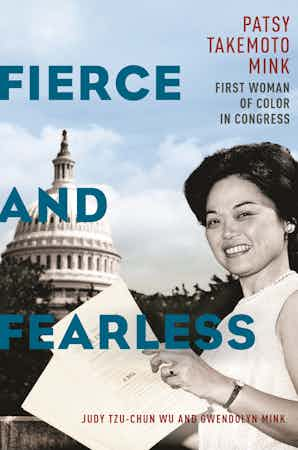Jo Freeman Reviews Fierce and Fearless: Patsy Takemoto Mink, First Woman of Color in Congress
Review of
Fierce and Fearless: Patsy Takemoto Mink, First Woman of Color in Congress
by Judy Tzu-Chun Wu and Gwendolyn Mink
New York: NYU Press, 2022, 456 pages with 30 photographs included, $35 hardcover 

by Jo Freeman
Patsy Takemoto Mink was a very political woman. Mink's grandparents were born in Japan. She was born and raised in Hawaii, and grew up on a sugar plantation. Elected president of her high school student body during World War II, she would run for one office or another the rest of her life. She served in elected office at the local, state and federal levels, with a brief stint in the Carter Administration.
Patsy Mink is best known as the mother of Title IX of the Education Amendments Act of 1972 which prohibits sex discrimination by any unit of an educational institution that receives federal funds. While she didn’t write it, she was the key House leader, so much so that it was renamed after her in 2002. The scope of Title IX was wide. Among other things it removed the quotas on women common to schools and departments. But its impact on college sports drew the most attention, by forcing colleges to fund women’s sports equally with men’s. Opposition was loud and the attempts to amend it were many by those who did not like gender equity in sports.
Mink had wanted to go to medical school, but couldn’t get in. She was admitted to the University of Chicago Law School, leaving a few years later with a J.D. and a new husband. She soon gave birth to her sole child but couldn’t find work as a lawyer. Back in Hawaii, she opened her own law practice and became active in the Young Democrats. She quickly moved from supporting candidates to becoming one. Service in various offices eventually led to her election to the U.S. House in 1964. She served until 1977, having been defeated in her attempt to become a Senator. She successfully ran for her old seat in 1990 and served until she died on September 28, 2002.
The importance of race and sex in Mink’s life runs throughout this book. She was praised for her cute appearance and panned for her strong positions. In her early races she was called “soft on communism” and in her later ones “soft on terrorism.” She fought for women in poverty to get more benefits, against nuclear testing and war in general. Her thumbprint appeared on virtually all legislation to improve the status of women.
Co-authored by an historian and a political scientist, who was also Mink’s daughter, this book covers the policy issues to which Rep. Mink was devoted. Both authors are professors at different branches of the University of California. They had ready access to public and private documents which they use to illuminate the story behind some of the policies they go into, as well as Mink’s personal life. Some of this book is autobiographical. Professor Mink tells personal and family stories in her own voice.
Mink was blessed with a very supportive family. Her husband, and eventually her daughter, were her chief political advisors, arranging their lives to fit her needs. Above all this book is a story of women’s entry into politics, progressing from tokens to major players. They banged on glass ceilings and pushed open stuck doors. In this effort, Rep. Patsy Mink was often leading the charge.
Copyright © 2022 Jo Freeman
Editor's Note: Jo has finished her book on working in the Southern civil rights movement is looking for a publisher.






